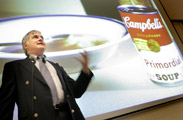Listening to the great beyond
Seth Shostak believes in aliens. And there is a good chance you do too if you were one of the hundreds who heard him speak last March 30. In a jammed McIntyre Amphitheatre, Shostak delivered a rousing lecture in which he made a compelling case for the presence of beings on other planets who will be in touch with us before long.

Senior astronomer with the SETI Institute, Seth Shostak, the latest speaker in the Astrobiology Lecture Series
Owen Egan
Shostak is a senior astronomer with the SETI Institute, the American-based research group whose acronym stands for the Search for Extraterrestrial Intelligence. He was at McGill to give a talk entitled "When Will We Detect Extraterrestrials?" for the Astrobiology Lecture Series.
Shostak's presentation was a jolly mix of the cosmic and the comic, as he interwove pop culture icons with the latest details of the SETI Institute's search for life elsewhere in the universe. He explained how recent advances in astrophysics have allowed researchers to hone in on the location of thousands of planets, meaning that the institute's search through "the cosmic haystack" is becoming more precise every year.
"Planets are as common as cheap motels," quipped Shostak, who told the audience that the present era of indexing the heavens is akin to 1492 when, in one generation, a group of explorers mapped most of the globe.
The efforts of Shostak and his colleagues to discover extraterrestrial life is premised on the fact that however difficult it may be to travel to the stars, it is very easy to send information to them. The group is expanding its efforts to employ radio telescopes as a means of detecting signals from other galaxies. The Allen Telescope Array in California will allow researchers to not only search for direct messages, but also to detect inadvertent cosmic noises that might be emanating from other planets. Just as our own CBC leaks into outer space, some form of "Alien Idol" might conceivably be drifting our way via radio or microwaves. Should this be the case, the institute's new radio-telescope cluster will be capable of listening in.
As he gave a nimble explanation of the SETI Institute's methodology, Shostak also entertained the audience with popular culture depictions of extraterrestrial activity. Slides showed everything from pulp novel aliens to UFOs in Area 51, as Shostak gently debunked some of our society's more persistent myths about outer space. Crop circles received a special dose of skepticism.
"It just doesn't seem likely that they'd come all the way here to carve graffiti into our wheat -- usually on a Friday night," he noted.
But joking aside, Shostak is convinced that extraterrestrial contact will occur in the near future. His optimism is partly fueled by the expanding pace at which scientists are locating new planets, and by the increased listening power of earth's telescopes. The Allen Telescope Array, in particular, represents a large advancement. The planned array consists of 350 small telescopes that are wired together so as to converge on many frequencies at once. The upshot is that scientists will be able to monitor more of the cosmos than ever before, making it increasingly possible that a signal can be detected. Shostak is presently so optimistic about making interstellar contact that he put a latte on the line, promising to buy the entire audience a deluxe coffee if a signal is not detected.
"We will have a signal in the next two dozen years. You will be alive when this happens," he said.
The conclusion of the lecture was received with considerable applause from the audience, who then asked a series of questions. Based on the queries and on a loose poll conducted by Shostak at the beginning of the talk, it was apparent that about two-thirds of those present believed in extraterrestrial life, with the other third unconvinced.
One of those in the former camp is Professor Hojatollah Vali of the Departments of Earth and Planetary Sciences and Anatomy and Cell Biology, who organized the event in conjunction with his undergraduate course in astrobiology. Vali was clearly pleased by the large turnout, and took care to thank the sponsors who contributed to the lecture's success. These included the Beatty Memorial Lectures Committee, the Canadian Space Agency and the Faculties of Medicine and Science.
